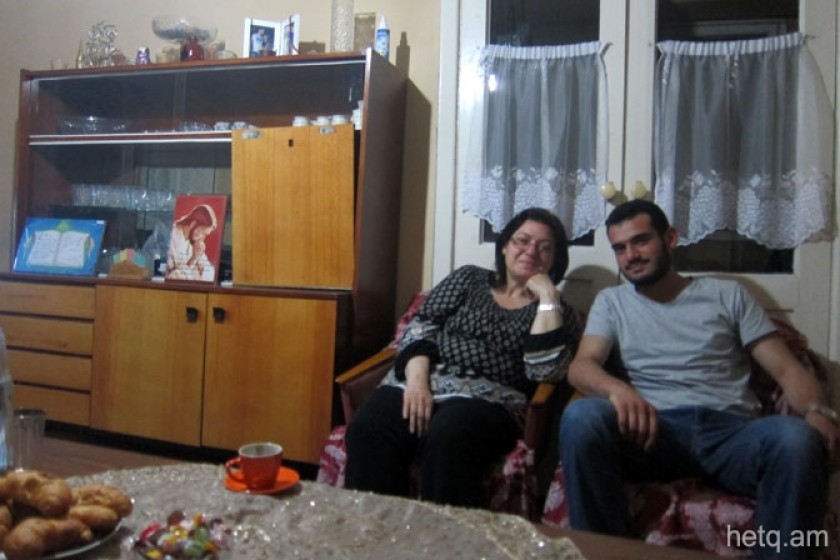
Armenia or Turkey? Laklakian Family from Aleppo Faces Difficult Choice
Gayaneh Sargsyan
Kevork Laklakian left Syria two years ago.
Ever since, he’s been foundering as to where to resettle – Armenia, Istanbul, or even back to Syria.
In 2013, Kevork, a knowledgeable auto repairman, went to work at a Yerevan repair shop.
“I was getting 15, 000 dram every week. It wasn’t enough to cover all my expenses, rent and other things,” Kevork says.
A few months after relocating to Armenia, Kevork’s family moved to Istanbul from Syria. The family advised him to come to Istanbul as well and Kevork regarded it as a viable option. So he left Armenia for Turkey and went to work.
“I went to work at the German Bosch company and remained for one year. I did all the work but got a tiny salary; US$400 a month. That’s nothing to live in Istanbul. The apartment rent was $450. First off, they treat Syrians poorly and I am Armenian to boot. They don’t take a kind view of you living on Turkish soil. On top on that they would tell me to go to the mosque to pray. They would say like it or not you have to go and accept Islam. They would ridicule Christianity and the cross,” Kevork recounts.
A year later, Kevork decides to return to Armenia. Reaching Georgia, he was sent back to Istanbul and in Ukraine they tore up his passport, wishing him well in the bargain. He finally made it to Armenia on the third attempt travelling by bus.
‘After living in Turkey I figured that even though I didn’t have much money in Armenia at least it was an Armenian country, a Christian country,” Kevork says.
He again got a job as an auto repairman and later was invited to work at a shop in Vanadzor.
Later, he was joined by his mother, two sisters and his brother and sister-in-law. The two sisters and brother, all jewelers, weren’t able to find comparable work in Vanadzor. For various reasons they had t leave the jobs they did find.
The Laklakian family, who owned an auto repair shop in Aleppo, have had a difficult time in Armenia when it comes to making a living.
“We decided to come to the homeland and settle. But work and money is scare here. One can’t live. They told us not to go, there is no work, and that people are going to Russia. I said no, we can make enough to live there. You have to come and see for yourself to be convinced that the money situation is difficult in Armenia,” says Kevork’s mother Hayganoush.
Kevork says that while his sisters have found work they are getting paid less than others, just like in Istanbul.
Hayganoush came to Armenia with her husband as tourists in 1982. “It’s great for tourists that come with money. But one has to live to understand whether it’s good or bad,” she says.
“In Syria you get paid the first of the month. You know that you’ll get your wages. It’s the same in Istanbul. But it’s not like that here. God only knows when you’ll get paid. Either you don’t get paid or they give you less. They say the difference will be paid the next month. You have to beg for this and that. How can you live like that, especially with a family,” Hayganoush asks.
Laklakian family members say they like Vanadzor and its residents. Yerevan is different, says Kevork.
“In Yerevan they pay Syrian-Armenians 2,000 drams and others 3,000. Some days there is no work at all. In Yerevan, Armenians have started to exploit one another, to cheat one another. It isn’t like that in Vanadzor. That’s why I prefer it here. You can relate to people better. You can help each other,” Kevork says.
Kevork says that he doesn’t like the superior attitude that many in Yerevan have towards Syrian-Armenians.
“They don’t regard you as equals. Or else they say that you wouldn’t have come to Armenia unless you were forced to. They say that like it or not you’ll work and keep quiet. Such talk is insulting,” Kevork says.
After living in Vanadzor for several months, Kevork has studied the town but still hasn’t found answers to many questions that have arisen.
“You walk around and see destroyed factories. Why? We had great factories so why are they empty? Syria and Turkey used to compete to see who could make something the cheapest. We had thousands of different factories in Syria and had no need to get things from overseas. Here, they have plundered all the factories. The people are to be pitied. How can they live? Of course they will get up and leave. They should at least operate one factory,” says Kevork.
Meeting Vanadzor residents every day on work related issues, Kevork notes: “Lately, clients frequently come and say, ‘that’s it, I’m selling this car. We’re leaving Armenia’.”
Hayganoush waxes philosophical about their situation.
“We will live with patience. It’s the destiny of Armenians – patience and wandering.”
But for Kevork’s two sisters patience isn’t an option. Several days ago they left for Istanbul to work. Hayganoush says her married son will also be forced to go to Istanbul if he doesn’t find work in Armenia.
“He recently got married and wanted to raise a family here on Armenian soil,” says Hayganoush, for whom her children going to Turkey to live is a hard pill to swallow.
‘We say that Turkey is the enemy. But look at how developed Istanbul is. Just like Europe. It’s full of Armenians. . But why should we go to a foreign country? I’ll beautify my own country. My dream is to settle here. I want to remain in the homeland. I’ve put my faith in God that it happens.”
Photo: Hayganoush and Kevork Laklakian
 Videos
Videos Photos
Photos




Comments (2)
Write a comment